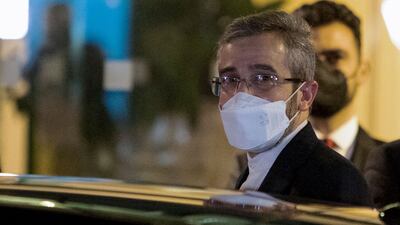Negotiators in Vienna are facing slow movement as Iran demands guarantees from the US that a new nuclear deal will not be at the whim of every new president.
Iran's demands for guarantees have become a roadblock in the talks, reported The Wall Street Journal.
Back in 2018, Donald Trump, US president at the time, pulled his country out of the Joint Comprehensive Plan of Action (JCPOA) and reimposed sanctions on Iran despite Tehran's adherence to the plan.
Now, Iran is demanding a guarantee that the same thing will not happen again and a promise that they will be able to reap the economic benefits of the sanctions relief.
However, the US is unable to give a guarantee that a new president and administration will stick to the accord. Iran is acutely aware of this issue and Supreme Leader Ali Khamenei has in the past addressed the Washington's inability to give a legal guarantee.
In a new report analysing the movement in Vienna, the Crisis Group wrote in the absence of guarantees, "many in Tehran worry sanctions relief will be ineffective, unsustainable and, perhaps, even detrimental to the Iranian economy as the spectre of reimposed sanctions haunts long-term planning".
In the years since Mr Trump pulled the US out of the JCPOA, Iran has pivoted its economy to both look inward and to the east, making deals with China and Russia in an effort to sustain its economy without western nations.
Unwinding its eastward facing economy and refocusing towards the West without guarantees could once again leave Iran's economy vulnerable to a heavy sanctions regime.
Despite the roadblocks, talks are making slow, incremental progress in Vienna and, according to The Wall Street Journal, European and US negotiators are looking at ways to help alleviate Iran's discomfort and offer other long-term commitments.
Iranian president Ebrahim Raisi is due to visit Moscow on Wednesday, the Kremlin said, to meet Russian President Vladimir Putin.
The meeting will be Raisi's most important official visit abroad since he took office, and the first visit by an Iranian president to Russia since 2017.
The leaders will discuss the "whole range of issues of bilateral cooperation", including the nuclear talks, Russia said.
The Iranian side confirmed the visit, saying Raisi would leave Wednesday for a two-day trip to Russia together with the country's oil, foreign and economy ministers.
A Russian lawmaker told reporters that Raisi would speak at the lower house of parliament, the State Duma, on Thursday, while TASS news agency cited a source as saying he would meet with religious leaders at Moscow's main mosque.
Israel said on Tuesday it had successfully tested a system designed to intercept ballistic missiles outside the earth’s atmosphere, part of an array of missile defenses it has developed in recent years to protect itself in any future conflict with Iran.
The Defense Ministry said the Arrow Weapon System system detected the target and fired two Arrow 3 interceptors at it, calling the mission a success.
“With every step forward, with every development, we equip the state of Israel with the capabilities to defend itself against developing threats,” Defense Minister Benny Gantz said in a statement. “Our systems provide Israel with the freedom to maneuver strategically.”
The system was developed by Israel Aerospace Industries, a state-run defense firm, in cooperation with the U.S. Missile Defense Agency.
“This test was designed to challenge every element of the Arrow Weapon System, and it performed beautifully,” said Vice Adm. Jon Hill, director of the agency. “MDA remains committed to assisting the government of Israel in upgrading its missile defense capability against current and emerging threats.”
Israel’s shorter-range missile defenses were on vivid display during last year’s 11-day Gaza war, when the Palestinian militant group Hamas fired over 4,000 rockets at Israel. The military says it intercepted around 90% of the rockets it targeted, with the others mostly falling in open areas.


